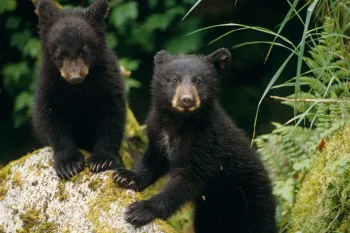TALLAHASSEE, Fla.—State residents are responding with outrage over the recent proposal from the Florida Fish and Wildlife Conservation Commission to reopen a trophy hunting season on the state’s iconic and beloved black bears. The plan would allow trophy hunters to kill as many as 187 bears using cruel methods like chasing bears with dogs, using food to bait bears for an easy kill and archery. The FWC held a series of webinars in March and early April to gather public feedback on the proposal that were attended by hundreds of Floridians, including from Humane World for Animals, formerly called the Humane Society of the United States. Most Floridians who participated spoke in strong opposition to the hunt.
The proposal marks a dramatic reversal from past efforts of Floridians to protect their bears. In 2015 the state agency authorized a disastrous bear hunt—the first and last time one had been held since the 1970s—in which more than 300 bears were killed in just two days. The hunt was quickly halted following intense public opposition, concerns over ethics and horror at the massive body count. The majority of bears killed in the hunt were females, about 40 of whom were mothers with cubs still nursing and dependent on them. The total number of orphaned cubs who may have also died as a result of this hunt remains unknown, but experts suspect it may have exceeded 100 cubs.
In its new proposal, the agency even acknowledged that black bears are not overpopulated in Florida, that Florida’s habitats could sustain even more bears and that a hunting season would not resolve human-bear conflicts. Instead, the FWC stated in their webinar that a focus of the bear hunt is to create “access to the resource” for a tiny, powerful group of black bear trophy hunters. According to federal data, fewer than 1% of Floridians hold hunting licenses, and far fewer than that would participate in the trophy hunting of such a rare and important native carnivore.
Kate MacFall, Florida state director for Humane World for Animals, said: “A Florida bear hunt has nothing to do with conservation and instead sacrifices Florida’s wildlife and the public trust to appease a tiny fringe group of trophy hunters. Practices like hounding and baiting—methods that inflict extreme cruelty and chaos in our forests—are even more disturbing. Floridians have overwhelmingly and repeatedly stated they do not want a bear trophy hunt. What will it take for their voices to be heard?”
Baiting, which involves attracting bears to feeding stations and subsequently shooting them while they gorge themselves, poses significant ethical concerns. This practice can acclimate bears to human foods, potentially increasing human-wildlife conflicts, and will contribute to an increase in the bear population and is contrary to the state’s purported objective of decreasing the population. Hounding is a dangerous and cruel practice that involves chasing bears with packs of hounds. Dog and bear fights can erupt before bears escape up trees, resulting in injuries or death—particularly to bear cubs. Hounds may trespass on private property, harass farm animals and pets, and endanger hikers, farmers and even motorists if animals cross roads. Trophy hunters using archery equipment often only injure but don’t quickly kill black bears. Instead, bears die slowly from blood loss.
More than two-thirds of Floridians oppose black bear trophy hunting. Furthermore, 78% of Floridians oppose hounding bears with packs of dogs, and 80% oppose shooting bears over bait stations.
The Florida Fish and Wildlife Conservation Commission is expected to vote on the proposal at their meeting in May. Floridians can voice their opposition by submitting comments on the proposal here by April 20 and by attending the next commission meeting on May 21 in Ocala.
“We strongly urge Floridians to voice their opinions about stopping this attack on our bears by submitting comments or by attending the meeting,” MacFall adds.
